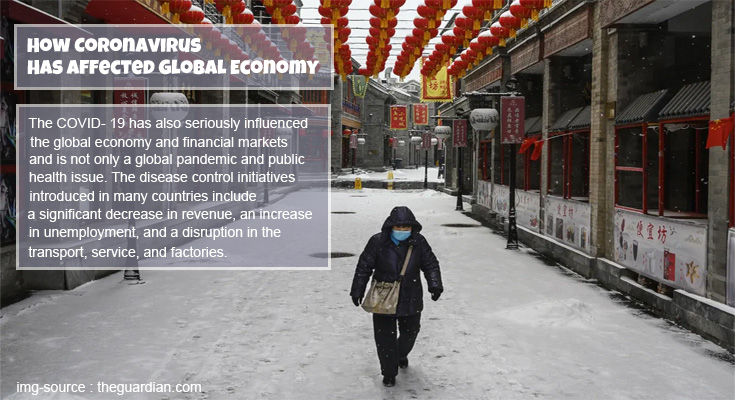The COVID- 19 has also seriously influenced the global economy and financial markets and is not only a global pandemic and public health issue. The disease control initiatives introduced in many countries include a significant decrease in revenue, an increase in unemployment, and a disruption in the transport, service, and factories.
Most governments underestimated the spread and were not prepared. Though, there are personal loans online reviews in the Uk that you can read about. Since disease outbreaks will not soon vanish, proactive global efforts are important not only to save lives but also to protect economic prosperity.
The coronavirus and the economics
Over 3 million cases were characterized as COVID-19, and 207,973 deaths in 213 countries and territories, on 11 March 2020, by WHO. BritainReviews suggest that not only has the virus been a problem in public health, but the global economy as well. Around the globe, the economic effect of decreased production, loss of life, company closures, disorders in trade, and the tourism industry’s decimation is already significant.
COVID-19 is a call for world leaders to intensify disease preparedness co-operation and provide funding for international joint measures. There have been extensive statistics on the expected health and economic cost of outbreaks of infectious disease. Still, global investment in prevention measures and preparedness to mend large-scale epidemics threats has not been vast.
Possibility of worse outcome
Businesses can find it difficult to service their debt; increased risk aversion may lead to loan costs and insolvencies, and defaults in many countries, leading to financial crises. Under this downside scenario, global growth could decline by nearly 8% by 2021.
If we look at the pace with which the global economy has overcome this crisis, we can indicate the depth of the recession. The rapid downturn of the global growth projection suggests that more downturns will be likely and that policymakers will need more action to boost economic activity in the coming time.
Long-term damage to future production and increased productivity
The present and future potential demand for oil, leading to the fluctuation in oil prices due to the decreased economic activity of the COVID-19 pandemic, poses major economic problems. The anticipated surplus supply also triggered large price reductions. If the oil price remains lower than predicted, many petroleum-based economies may contract a reduction in trade and investment.
Migrant workers are making significant contributions to employment markets globally, addressing both high and low-skilled job imbalance. Within the near future of international travel constraints and quarantines, as countries attempt to stop the spread of COVID-19, immigration flows might reduce, which will prevent global economic growth and development.
Bottom Line
As a result of the virus’s spread, we expect that the financial markets will remain volatile as they continue to interfere with business activities and adverse impacts on the factory and service industries, particularly in developed countries. Whether this crisis will continue to affect the global economy or have significant short-term financial and economic consequences is still a question, and it is still a matter of interest.
Everyone can see the potential for the high economic and financial cost to regional and international economies in infectious diseases such as COVID-19. Due to the high level of transportation connectivity, globalization, and economic interconnectedness, containing the virus and mitigating import threats became exceedingly difficult and expensive once the disease spread in many areas.
This ensures joint international action and global investment in the production and distribution of vaccines and preventive measures like capacity building in real-time monitoring and development at the national and international level of communication tracking abilities. Because when new diseases arise soon, concrete international intervention is not only needed to save lives but also to protect economic prosperity.





